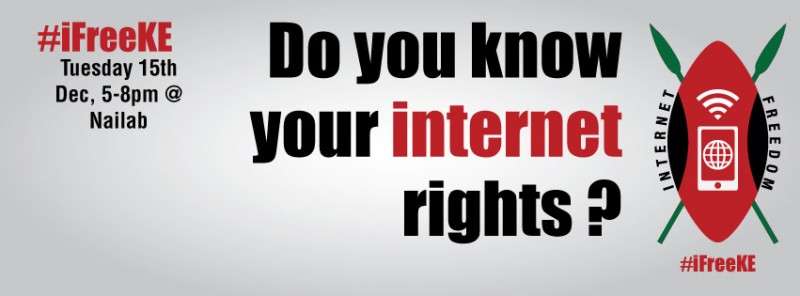By Marilyn Vernon |
In Kenya, whereas the use of the internet had expanded into all areas of day to day living, the threat of government surveillance and interference has impacted upon user confidence in the security of their online interactions. This comes after several local bloggers and social media users have been arrested and in some cases charged with misuse of licensed telecommunications equipment.
“The Kenya Government continues to use national security as a bigger right that trumps constitutional rights,” said Henry Maina, Regional Director of Article 19 East Africa. He said arrests and intimidation of government critics for expressing their opinions online “had become the norm” under the guise of national security.
Maina was speaking at an event aimed at promoting awareness on internet freedoms in Kenya. Organised by the Bloggers Association of Kenya (BAKE) under its Internet Freedoms Citizen Education Campaign, the event also aimed to help participants develop a deeper understanding of human rights online based on the African Declaration on Internet Rights and Freedoms. The declaration outlines 13 principles of human rights standards in internet policy formulation and implementation in Africa. These include openness, internet access and affordability, freedom of expression, right to information, and freedom of association and assembly.
The other principles are cultural and linguistic diversity, right to development and access to knowledge, privacy and personal data protection, security, stability and resilience of the internet, equality (gender and marginalized groups), right to due process, and democratic multi-stakeholder internet governance.
Kenya has one of the fastest growing rates of internet users in Sub-Saharan Africa, with the Communications Authority of Kenya (CAK) reporting an internet penetration rate of 54.8%. Coupled with the installation of fibre optic networks, the country also boasts the highest bandwidth with the fastest speed within the East African Community.
Social media remains a key contentious area on internet freedom in Kenya, where content posted has resulted in prosecution on unclear grounds. In December 2014, blogger Robert Alai was arrested and charged with undermining the authority of a public officer contrary to Section 132 of the Penal Code, by allegedly calling President Kenyatta an “adolescent president” in a blog. He was again arrested in February 2015 for offending a businessman online by linking him to a land saga that involved the illegal acquisition of the Langata Primary School playground.
Journalist Abraham Mutai was arrested following tweets he posted on corruption in the Isiolo County Government and was charged with the “misuse of a licensed communication platform to cause anxiety.”Another case in January 2015, involved a Kenyan student, Alan Wadi who was prosecuted and jailed for one year for insulting President Uhuru Kenyatta on social media.
More recently, the eruption of a Twitter storm dubbed #uhuruinkenya which mocked government spending on foreign trips had led to the alleged take down of a website created under the same hashtag. However, the Kenya Network Information Centre (Kenic), Kenya’s domain registry operator, denied taking down the site. The website isuhuruinkenya.co.ke which, is set to display a “YES” or “NO” when the president is in or out of the country respectively, has since been restored and is accessible within the country.
Also speaking at the event, Nanjira Sambuli, iHub Research Manager, stated that such incidents demonstrated that user vulnerability “is a very real threat” and reiterated the need to help users understand and make sense of digital safety and security, particularly the Terms of Service for social media platforms.
The issue of hate speech across ethnic and religious lines was also discussed, during which participants highlighted the need for user ethics and responsibility such as questioning and verifying sources before sharing information. “Security starts with you as the user,” noted Sambuli.
Kenya is party to a number of international human rights instruments and is a member of the Freedom Online Coalition – an intergovernmental coalition committed to advancing freedom of expression, association, assembly, and privacy online – worldwide. In 2012, Kenya hosted the Annual Freedom Online Coalition meeting in Nairobi. The previous year, it had hosted the global Internet Governance Forum (IGF) under the theme Internet as a catalyst for change: access, development, freedoms and innovation. However, these positive steps in the country’s recognition of internet freedom are subject to legislative and institutional hurdles, thereby making it difficult for citizens to freely enjoy their rights online.
The online conversation around the event was conducted with the hashtag #iFreeKE.
For further reference on what internet freedom means to Kenyan users see the Kenya Internet Freedoms campaign video.

